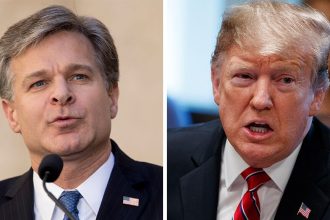The Agreement created one of the most complex political systems on Earth, dividing the nation of Bosnia and Herzegovina into two entities: the Federation of Bosnia and Herzegovina (FBIH, inhabited mainly by Bosniaks and Croats), and Republika Srpska (RS, inhabited by Serbs) with a smaller district, Brčko, left as an autonomous unit.
The constitutive peoples are Bosniaks, Serbs and Croats, represented by three members of the Presidency, one of each ethnicity, who collectively serve as a three-pronged head of state.
Furthermore, the administrative system envisioned the division of the FBIH into 10 cantons, each with their own government (and ministers), under the FBIH’s overarching government.
RS has a unitary government: it is not split into local administrative entities.
Brčko district, too, has its own distinct government, making Bosnia a nation with 13 governments (and 14 constitutions) for a population of 3.3 million.
The nation, however, is not a confederation, as no entity can simply secede without all the constitutive peoples’ consensus.
The FBIH’s Prime Minister (PM) is legally mandated to be a Bosniak, while the PM of RS is mandated to be a Serb. Neither Croats nor any other ethnic groups can legally become the PMs in these entities, nor can any ethnic groups other than Serbs, Croats, and Bosniaks serve as members of the Presidency of the country, which warranted a ruling by the European Court of Human Rights, declaring Bosnia’s electoral system discriminatory.
The Aspirations of Serbia and Croatia: Has Anything Really Changed?
One would be forgiven for thinking that the Bosnian conflict was merely frozen, since the country is so divided along the ethnic lines that there are even segregated schools for Bosniak, Croat and Serbian children, who speak different dialects of the same macro-language, with the difference arguably being no greater than between American, British and Australian English.
In fact, it appears that the goals of both Serbia and Croatia, expanding their territories to annex parts of Bosnia (and other neighboring states), to create a Greater Serbia and Greater Croatia, are still alive.
The Croats desire to create a third, Croatian entity in Bosnia. During the Bosnian War, they had established such an unrecognized entity, Herzeg-Bosnia, which they were forced to abolish after they signed (under immense American pressure) an agreement with the Bosniaks for a shared entity (FBIH) divided into cantons.
In exchange for Croatian support of this solution, the Western nations implicitly allowed Operation “Storm:” the final battle for Croatian independence fought against the Serbs (in parallel to the war in Bosnia), in which Croatia regained over 10,000 sq. km of territory and displaced around 150,000-200,000 Serbs who fled as refugees, lowering the number of Serbs in Croatia from 12% to 4%. Since Croatian independence is now unquestionable, Croatia has the influence to nudge the Bosnian Croats in the entity-demanding direction.
Similarly, Serbia has been pursuing the same irredentist goal (Greater Serbia, now called Serbian World), which was first formulated back in 1848, in “The Draft,” a secret Serbian policy document, which envisioned the reconquest of territories that had once belonged to the short-lived medieval Serbian Empire. Since the idea failed after WWII and once again in the Bosnian (and Croatian) War, the establishment of the Republika Srpska is the last straw of hope for Serbian nationalists.
The Serb Presidency member, Milorad Dodik, frequently threatens with RS’s unification with Serbia. Serbian intelligentsia of the Serbian Academy of Sciences and Arts provides full support for this intention, as a part of the greater plan to establish the Serbian World (arguably already underway in neighboring Montenegro).
Bosnia in Practice: What Is Going On?
Bosnia appears to be in a permanent state of chaos with disagreements on every major policy decision. Since no vital decisions can be reached without a consensus, at least one side always vetoes the others. For example, while Croats and Bosniaks agree on joining NATO, Serbs block the accession process. While Croats and Serbs would like more autonomy or even secession, Bosniaks would veto these. And while Serbs prefer an ever-closer relationship with Russia and Putin, Croats and Bosniaks are fiercely opposed.
Bosnia cannot even obtain a candidate status for joining the EU, due to an abundance of ethnic-oriented laws incompatible with the EU, not to mention the inefficiency of the massive government apparatus.
As a result, hundreds of thousands are leaving Bosnia, an exodus projected to increase to almost 30% of the population leaving by 2050.
Allegations of high-level corruption coupled with high unemployment and low salaries only worsen the situation.
Bosnia Between Russia and the West: Cold War Training Field
Given the extent of the issues Bosnia faces, recently, there have been calls for the Dayton Agreement’s revision, crucial for EU accession. The U.S. President-elect, Biden, stated that all sides should consider the possibility to “decide again on the difficult but necessary steps to build a fully functional Bosnia and Herzegovina for all its citizens.”
U.S. Deputy Assistant Secretary and Special Representative for the Western Balkans, Matthew Palmer, directly said that constitutional changes and changes to the government structure are necessary.
Russia and Serbia on the other hand are fiercely opposed to any revisions. It should come as no surprise, given the amount of influence Russia has on Bosnia through their close relations with Dodik.
Since all vital decisions, including NATO membership, must be agreed upon by all the peoples (hence Presidency members), Dodik, to the Russians’ delight, keeps vetoing all of these policies unfavorable to Russia. By keeping Bosnia fragmented and dysfunctional, Russia can ensure NATO does not expand. This works perfectly for Serbia too, since NATO membership reduces the chances of establishing the Serbian World (which NATO already stopped once in the ‘90s due to its violent nature).
Just like in Montenegro before the 2020 elections, Russia and Serbia have opened an information-war on Bosnia too, spreading disinformation and encouraging anti-NATO, Serbian unitarist views. It’s been intensified after the 2016 Russian failed coup attempt in Montenegro (where the alleged plan was to assassinate the PM and prevent the country from joining NATO), since after losing a big part of their influence there, if they lost Bosnia too, they would have lost the Balkans to the West, even with Serbia on the Russian side. Bosnian intelligence officers even report that their Russian counterparts operate in Bosnia under diplomatic cover.
Given the ubiquitous conflict potential in Bosnia, which could spread to other Balkan nations, known for inter-ethnic tensions, Russia has an important tool in their hands for negotiating with the West. Both the options of “trading” the Balkans for concessions in Eastern Europe by the West, and of destabilizing it further, especially NATO-member Montenegro (potentially even making it leave the Alliance, thereby strategically gaining Mediterranean Sea access) are open.
In Summary: (Re)drawing the Line
Luckily for the Bosniaks, the U.S. is returning to the Balkans. After being somewhat neglected by the Trump administration which lacked knowledge on the Balkan affairs, Biden is significantly more familiar with the situation and ready to intervene. Biden was personally advocating a solution to the ‘90s Yugoslav wars as a senator, and he is well aware of the local political actors, especially since some of them are still in power.
If Bosnians are to have any perspective in the future, then it’s clear that the Dayton Agreement must be revised, so the country can join the EU. While the U.S. began pushing in the direction of reforms, the Russians and Serbs are unwilling to concede, fearing the RS would eventually be abolished, while Croats desire their own entity. In this perpetual Bosnian stalemate, all the citizens are losing, perpetually.













